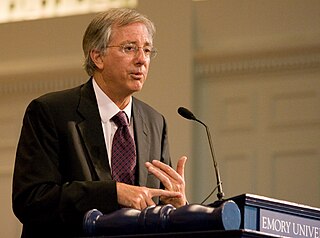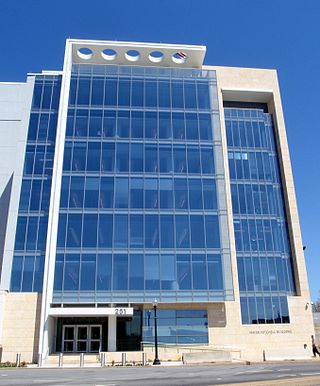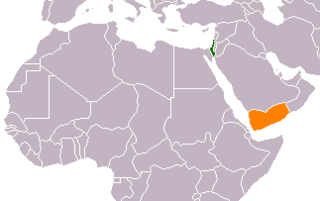An intifada is a rebellion or uprising, or a resistance movement. It is a key concept in contemporary Arabic usage referring to a legitimate uprising against oppression.

The First Intifada or First Palestinian Intifada, also known simply as the intifada or the intifadah, was a sustained series of protests and violent riots carried out by Palestinians in the Palestinian Territories and Israel. It was motivated by collective Palestinian frustration over Israel's military occupation of the West Bank and the Gaza Strip, as it approached a twenty-year mark, having begun after Israel's victory in the 1967 Arab–Israeli War. The uprising lasted from December 1987 until the Madrid Conference of 1991, though some date its conclusion to 1993, with the signing of the Oslo Accords.

Carlos Latuff is a Brazilian political cartoonist. His work deals with themes such as anti-Western sentiment, anti-capitalism, and opposition to U.S. military intervention. He is best known for his images depicting the Israeli–Palestinian conflict and the Arab Spring events.

Dore Gold is an American-Israeli political scientist and diplomat who served as Permanent Representative of Israel to the United Nations from 1997 to 1999. He is currently the President of the Jerusalem Center for Public Affairs. He was also an advisor to the former Israeli Prime Minister Ariel Sharon and to Prime Minister Benjamin Netanyahu during his first term in office. In May 2015, Netanyahu named him Director-General of the Israeli Ministry of Foreign Affairs. From June 2015 until October 2016 he served as Director-General of the Israel Ministry of Foreign Affairs.

The Israeli–Palestinian peace process refers to the intermittent discussions held by various parties and proposals put forward in an attempt to resolve the ongoing Israeli–Palestinian conflict. Since the 1970s, there has been a parallel effort made to find terms upon which peace can be agreed to in both the Arab–Israeli conflict and in the Palestinian–Israeli conflict. Some countries have signed peace treaties, such as the Egypt–Israel (1979) and Jordan–Israel (1994) treaties, whereas some have not yet found a mutual basis to do so.

Dennis B. Ross is an American diplomat and author. He has served as the Director of Policy Planning in the State Department under President George H. W. Bush, the special Middle East coordinator under President Bill Clinton, and was a special adviser for the Persian Gulf and Southwest Asia to the former Secretary of State Hillary Clinton.

Russia and the Iran–Israel proxy conflict deals with Russian foreign policy in the Middle East during the early 2000s, in light of the Iran–Israel proxy conflict.

Martin Sean Indyk is an American diplomat and foreign relations analyst with expertise in the Middle East. He was a distinguished fellow in International Diplomacy and later executive vice president at the Brookings Institution in Washington, D.C from 2001-2018. He took leave from the Brookings Institution to serve as the U.S. Special Envoy for Israeli–Palestinian Negotiations from 2013 to 2014. He is currently a distinguished fellow at the Council on Foreign Relations.

The Israel Lobby and U.S. Foreign Policy is a book by John Mearsheimer, Professor of Political Science at the University of Chicago, and Stephen Walt, Professor of International Relations at Harvard Kennedy School at Harvard University, published in late August 2007. It was a New York Times Best Seller.
StandWithUs (SWU) is an international, right-wing pro-Israel advocacy organization StandWithUs has worked closely with the Israel Ministry of Foreign Affairs to promote Brand Israel. It was founded in 2001 Los Angeles by family therapist-turned-activist Roz Rothstein and her husband and is headquartered in the United States.

The Islamic Republic of Iran officially recognises Palestine as a state. Ali Khamenei, the Supreme Leader of Iran, rejects a two-state solution and implies that Palestine is inseparable, while Iran's former President Mahmoud Ahmadinejad called for a free referendum for the entire Palestinian population, including Arab citizens of Israel, to determine the type of government in the future Palestinian State, while reiterating that establishment of a Palestinian State alongside Israel would "never mean an endorsement of the Israeli occupation".
The Arab lobby in the United States is a collection of formal and informal groups and professional lobbyists paid directly by Arab governments or Arab citizens in the United States that lobby the public and government of the United States on behalf of Arab interests and/or on behalf of Arab Americans in the United States.

The Israel lobby, also known as the Zionist lobby, are individuals and groups seeking to influence the United States government to better serve Israel's interests. The largest pro-Israel lobbying group is Christians United for Israel with over seven million members. The American Israel Public Affairs Committee (AIPAC) is a leading organization within the lobby, speaking on behalf of a coalition of American Jewish groups.
Kathleen (McGrath) Christison is an American political analyst and author whose primary area of focus is the Israeli–Palestinian conflict.
Henry Siegman is a German-born American. He is President of the U.S./Middle East Project (USMEP), an initiative focused on U.S.-Middle East policy and the Israeli–Palestinian conflict, launched by the Council on Foreign Relations in 1994, and established as an independent policy institute in 2006 under the chairmanship of General (Ret.) Brent Scowcroft. As of July 1, 2016 Siegman will assume the title of President Emeritus of the USMEP.
Different Muslim movements through history had linked pacifism with Muslim theology. However, warfare has been an integral part of Islamic history both for the defense and the spread of the faith since the time of Muhammad.

The foreign policy of the Mahmoud Ahmadinejad administration was the policy initiatives towards other states by the former President of Iran, as different from past and also future of the Iranian foreign policy. Ahmadinejad's tenure as president came at a time of greater conflict, rhetorical or physical, than his predecessors. In following this there were various measures, external or internal, that led to his policy changes. This was primarily a division between relations with states of the Western world and the rest of the world.

There are no diplomatic relations that exist between Israel and Yemen and relations between the two countries are very tense. Yemen refuses the admission of people with an Israeli passport or any passport with an Israeli stamp, and the country is defined as an "enemy state" by Israeli law.

Phyllis Bennis is an American writer, activist, and political commentator. Focusing mainly on issues related to the Middle East and the United Nations, she is a strong critic of Israel and the United States and a leading advocate of Palestinian rights.
Claude Salhani was an Egyptian-born American photographer for United Press International (UPI) and Reuters news agencies, later head of UPI Photos and UPI Foreign Desk Editor as well as policy expert and author, best known for his photographic reportage of the 23 October 1983 Beirut barracks bombings on the United States Marines. During his journalism career, Salhani covered Black September, the Lebanon Civil War, the Turkish invasion of Cyprus, the Dhofar War (Oman), the Iran-Iraq War, the 1982 Israeli invasion of Lebanon, the 1979 Iranian Revolution, the Gulf War, the Fall of the Berlin Wall, the Czech Velvet Revolution, and the Iraq War as well as the wider Middle East, Europe, and Africa.












